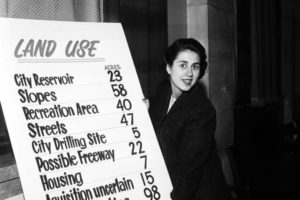Out from the Archives: Rosalind Wiener Wyman
“They couldn’t believe that I could win,” Rosalind Wiener Wyman remembered about her unexpected election to the Los Angeles City Council in 1953. Over the course of several interviews in 1977 and 1978, Wiener Wyman shared her personal and political triumphs and losses, which culminated in her oral history, “It’s a Girl”: Three Terms on the Los Angeles City Council, 1953-1965; Three Decades in the Democratic Party, 1948-1978. Wiener Wyman’s memories as a woman politician at midcentury are part of the Oral History Center’s California Women Political Leaders Oral History Project, which documented “California women who became active in politics during the years between the passage of the women’s suffrage amendment and the…feminist movement.”
Wiener Wyman came by her passion for politics honestly. Speaking of her parents, she reflected, “I always felt their activities and interest in politics was steeped in me. In my baby book, at two, I’m looking up at a picture of FDR [Franklin Delano Roosevelt]. Most kids in their baby book are not looking at posters of FDR.”

While a student at the University of Southern California, Wiener Wyman and the campus Democratic Club worked on Harry Truman’s 1948 campaign. But her political work began in earnest when she met her “heroine,” Helen Gahagan Douglas, then a member of Congress representing California and running an ultimately unsuccessful campaign for Senate in 1950. Wiener Wyman was disappointed in Gahagan Douglas’s showing on the campaign trail and confronted her about it. Gahagan Douglas replied, “ ‘If you know so much about a campaign, here, here’s a card. Come see this lady and get into my campaign.’ ” Wiener Wyman took up the challenge and threw herself into this work, hanging posters and driving Gahagan Douglas to her campaign stops. Laughing, Wiener Wyman recalled, “I remember once changing my hose in the car with her in a parade. She took mine and I took hers. Crazy things a woman candidate worries about.”
Wiener Wyman began her own political career fresh out of college. In 1953, she ran a grassroots campaign for Los Angeles City Council that relied solely upon door-to-door conversations with her constituents, without the benefit of media coverage or traditional advertising. Her victory over established, male candidates was such a surprise that she recalls from the night of the election:
As the bulletins were handed to [Joe] Micchice, [a local radio announcer], he said, “I’m sure that the votes are on the wrong name.” So, he, during the night, would give my vote to Nash. Finally he put his hand over the mike–we have this on a record which is so wonderful–and he said, “Is this bulletin right?” Or, “Who the hell is Wiener?”
After a runoff election, Wiener Wyman came out on top. Of this dark horse winner, the Los Angeles Times declared, “It’s a girl!”
Wiener Wyman stood out as the youngest member and only woman on the Los Angeles City Council from 1953 to 1965. Notably, Wiener Wyman did not see herself as a victim of gender discrimination; rather, she saw her break with other council members in terms of age and experience. This, despite the fact that other city council members voted to not allow her personal leave to enjoy her honeymoon. Additionally, Wiener Wyman had to contend with the fact that “the only toilet was off the council chambers and that was for the men.” She recalled, “That became an incredible issue that got around town. Where was I going to go to the bathroom? I thought I would die over that!”
During her time in office, Wiener Wyman famously led the charge to entice the Brooklyn Dodgers to Los Angeles, making it the first Major League Baseball team west of the Mississippi River. Although the displacement of Mexican American families from Chavez Ravine and the building of Dodgers Stadium was controversial then and now, Wiener Wyman defended her support for this civic boosterism and the prestige it brought to Los Angeles. However, she conceded of her leadership on this fight: “it probably cost me some of my popularity.”
Beyond her twelve years in elected office, Wiener Wyman’s political legacy perhaps best lies in her fundraising efforts for other Democratic candidates. During one memorable event in the backyard of her Los Angeles home, Wiener Wyman and her husband, Eugene Wyman, hosted a dinner for Democratic congressional candidates and charged $5,000 a couple, an unthinkable sum in 1972.
Rosalind Wiener Wyman’s life and career point to the many ways in which California women have and continue to engage in political life, as well as the rich collection of political history at the Oral History Center. As we approach the hundredth anniversary of women’s suffrage, documenting the experiences of these women political leaders will become all the more important.
Amanda Tewes, Interviewer/Historian